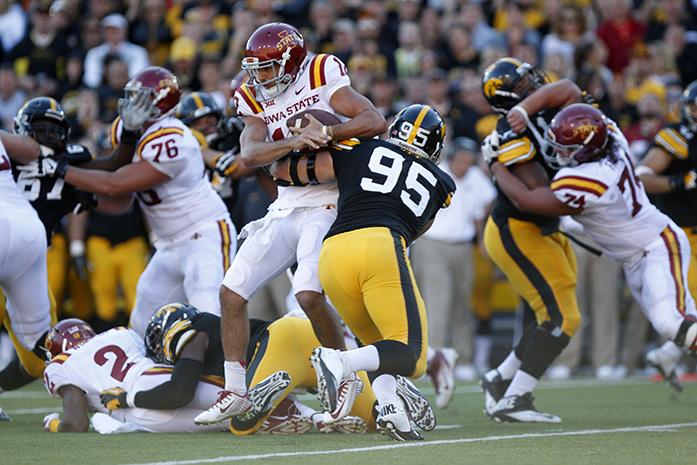Iowa’s defensive standout may be done as a Hawkeye, but a long career at the next level could be in his future.
By Charlie Green
The momentum and excitement surrounding Iowa’s 6-0 start hit a speed bump Oct. 10 with the news that star defensive end Drew Ott had suffered a torn ACL.
Ott’s season — one already limited by an elbow injury — ended before it really even began. With it went his career as a Hawkeye.
At his Tuesday press conference, head coach Kirk Ferentz repeated a message he had for NFL scouts.
“The one thing I’ve told them about Drew, all year long, is he’s better than you think he is,” he said. “There are some players I can describe that way.”
One of those players is Aaron Kampman, who played for Iowa from 1998-2001. Kampman became an all-conference player by the time he was finished, but his accomplishments didn’t get him much attention from NFL front offices
“I’ll go back to Aaron Kampman, for whatever reason, didn’t get invited to the combine,” Ferentz said. “I’ve never called the combine, I’ve coached for a while, but I did that year and told the guy they were making a mistake.”
A couple of months later, the Green Bay Packers called his name in the fifth round of the 2002 NFL draft, and over the next 10 years, Kampman established himself as one of the best defensive ends in Packer history.
The parallels between him and Ott are obvious. The two are the same height, virtually the same weight, and play the same position.
According to CBS Sports NFL draft scout Dane Brugler, Ott entered the season viewed primarily as a late-round prospect but steadily moved into the mid-round range. With the draft set to begin in late April, Ott has ample time to rehabilitate his knee. And in today’s age of modern medicine, surgery, and rehab practices, the injury is not quite as debilitating in the long term as it once was.
“Obviously, the ACL tear is a setback and unfortunate for the player,” Brugler said. “But with plenty of time between now and the draft process, Ott has time to rehab the knee and prove to teams he’s fully healthy in the spring. And as long as he does that, he should regain his draft status as a mid-round player.”
Brugler’s assessment of Ott as a player is positive overall. He credits the end with strong hands and controlled athleticism at the point of attack. Snap anticipation and momentum created by a quick first step make him effective against the run and as a pass rusher. He also doesn’t allow blockers to hold him down for long.
One of the negatives Brugler sees is that Ott is late to find the ball at times and has to use his aggressive nature to be a more consistent finisher.
Either way, he’ll likely be playing on Sundays in the near future assuming the knee heals properly.
“It’s not going to derail him,” Ferentz said. “He’ll get an opportunity, and he’ll do very well. I’ll be shocked if he’s not on somebody’s roster a year from now.”
The loss of Ott hurts the Hawks physically, mentally, and, perhaps most of all, emotionally. The senior embodied everything the program hopes to encompass.
Growing up on a farm in Nebraska, his country roots characterized him in his time at Iowa.
Away from the game, he ate raw eggs — shell included. He rode his moped down the back roads of Iowa and Nebraska 12 hours to his childhood home. He won hay-bale tosses in Solon, wearing overalls.
On the field, and in his preparation, teammates and coaches speak of his unmatched work ethic and attitude. Quiet in front of the media, Ott’s focus revolved around his role on the team, which in 2015 was quite large.
Ott’s days of college football are in the past. His days as a pro aren’t far around the corner.
All it takes is a look back at Kampman, who made two Pro Bowls, one All-Pro team, and played 10 years at the highest level of the game after few believed he could.
“Drew’s a guy who doesn’t fear anything,” teammate Parker Hesse said. “Whatever obstacle is in his path, he’s not going to be afraid to take it on.”
Follow @CharlesGreen on Twitter for Iowa football news, updates, and analysis.



